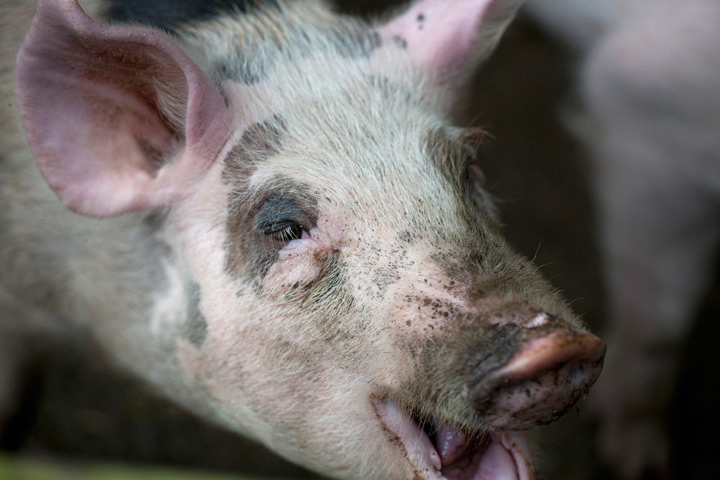Ignorance is bliss, says a quarter of Canadians – they would rather not know the details of what’s in their food or where it comes from, according to a new poll.

The exclusive Ipsos poll for Global News asked people about how they choose their food. And while most Canadians agreed that it’s important for them to know what’s in their food and where it came from, one quarter said they would rather not know.
READ MORE: Who do Canadians trust with their food? Local growers get top marks
“We know that people do feel incredibly overwhelmed by the amount of choice and amount of information that they have when they make choices in the grocery store,” said Josée Johnston, associate professor of sociology at the University of Toronto.
“That feeling can lead to a feeling of overwhelm and anxiety and also an uncertainty about where the truth really lies. So given that, I think some people prefer to not know because they feel like it’s too hard to parse out where to get accurate information from.”
While she thinks that people are increasingly interested in information about their food, when it comes down to it, they might not want to know the exact details of how their hamburger got to their dinner table. “I think it’s such an interesting example of where people want to know, but don’t want to know.”
Paul Rozin, a psychology professor at the University of Pennsylvania, agrees that a lot of people would rather not know too much. “Not that they’re necessarily afraid of knowing it, but it’s a lot of information and there’s other information they’d rather get.”
How people choose their dinner
How people choose what to eat is more complicated than just information about the health and provenance of the food, according to Rozin.
“In developed countries, the main force that makes people choose one food or another is taste,” he said. “They buy what they like to eat.”
People around the world have a taste for sweet and fatty foods, he said, but the exact form that those preferences take is shaped by culture: a Snickers bar versus jalebi (a deep-fried South Asian sweet), for example.
Price is also a factor of course. “Lobster is expensive, so you might eat less than you’d like,” he said. So is availability – you can’t eat what you can’t get.
He believes that convenience and health concerns are increasingly shaping the food choices of North Americans though. “Many people, not all, make their choices on the basis of what they think is healthy. Even though they might like something, for instance they might like ice cream better than cottage cheese, they might eat cottage cheese because they think it’s healthier,” he said, though those decisions are made on the perceived healthiness of the food. Different cultures might perceive different things to be healthy, and information can change over time.
There is often a tension between choosing foods that are convenient and familiar, and choosing things that are healthy or affordable, said Johnston.
“I would say we worry too much about health. If you eat a wide range of foods and don’t eat too much, you’ll be fine,” said Rozin. “It sort of spoils the eating experience to constantly be thinking that this bite of something is not healthy.”
“I think Americans in general have made eating a less pleasant experience by worrying on a bite-by-bite basis.”
How much information is too much?
Having more knowledge about your food doesn’t always change your eating habits, said Johnston. “In my undergraduate classes, the students want to know about the food system, but then a lot of them will say, this information is interesting, but at the end of the day, I’m still going to go and eat a McDonald’s cheeseburger,” she said.
“It’s not like simply having knowledge will lead to different food choices.”
However, knowledge about the particulars of the slaughterhouse is more difficult to ignore, said Rozin. “That’s not a good thing for people to see. People aren’t thinking of killing cows when they’re eating beef.”
North Americans have divorced our cuts of meat from the animals they come from, he said.
“Our red meats don’t look like what they’re part of,” he said. “And that’s intentional because people are reluctant to know that animals are housed in a factory-like way and killed so they can have a piece of meat. They prefer to live in a world where that isn’t in their face.”
Many consumers will change their habits at least a little, faced with that knowledge, said Johnston. Some become vegetarians. Others search for more “ethical” meats, from a butcher or retailer that they trust has ensured animal welfare in some way.
“There’s no way to have complete purity in the realm of food choices, but they might pick the one thing that they won’t compromise on. That may be the naturally-raised meat, or organic milk,” she said. “People will often take it on an issue-by-issue basis.”
Exclusive Global News Ipsos polls are protected by copyright. The information and/or data may only be rebroadcast or republished with full and proper credit and attribution to “Global News Ipsos.”
The poll was conducted between May 22 and 27, 2015, using a sample of 1,005 Canadians. It is accurate to within +/ – 3.5 percentage points, 19 times out of 20, of what the results would be had all Canadian adults been polled.



Comments